Key takeaways:
- Dyslexia involves challenges beyond reading, including writing and verbal communication, impacting self-esteem and emotional well-being.
- Setting realistic, tailored school expectations fosters a supportive learning environment that acknowledges individual strengths.
- Effective communication with teachers and building a support network enhances academic experiences and understanding of dyslexia.
- Developing personal coping mechanisms, like organized note-taking and mindfulness, is essential for managing school tasks and expectations.
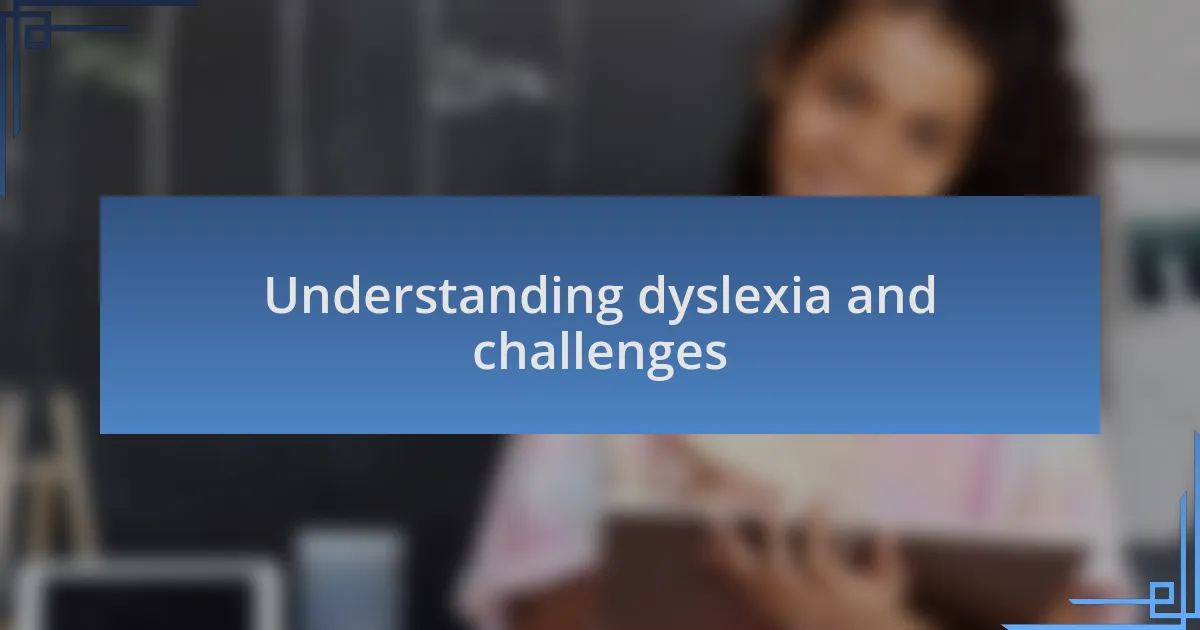
Understanding dyslexia and challenges
Dyslexia is often misunderstood, with many people viewing it solely as a reading difficulty. I remember a time in school when I would stare at a page, words dancing before my eyes, feeling a mix of frustration and embarrassment. It’s essential to recognize that dyslexia doesn’t reflect a lack of intelligence; instead, it involves different ways of processing information, which can be incredibly challenging in traditional educational settings.
The challenges extend beyond reading, affecting writing and even verbal communication. I still think back to my spelling tests, where I would be filled with anxiety, knowing I would struggle to keep up with my peers. This aspect often isolates individuals with dyslexia, leading to feelings of frustration and low self-esteem. Have you ever experienced that crippling sense of inadequacy when compared to others? It’s a journey that requires understanding and patience—both from ourselves and the educators around us.
Another critical aspect of dyslexia is the emotional toll it can take over time. I’ve seen friends lose interest in school altogether due to repeated setbacks, which is heartbreaking. It’s vital for individuals—especially teachers and parents—to foster an environment where mistakes are seen as stepping stones rather than failures. How can we create spaces that celebrate our unique learning styles while addressing these challenges? Through open conversations and support, we can begin to change the narrative around dyslexia, paving the way for greater acceptance and understanding.
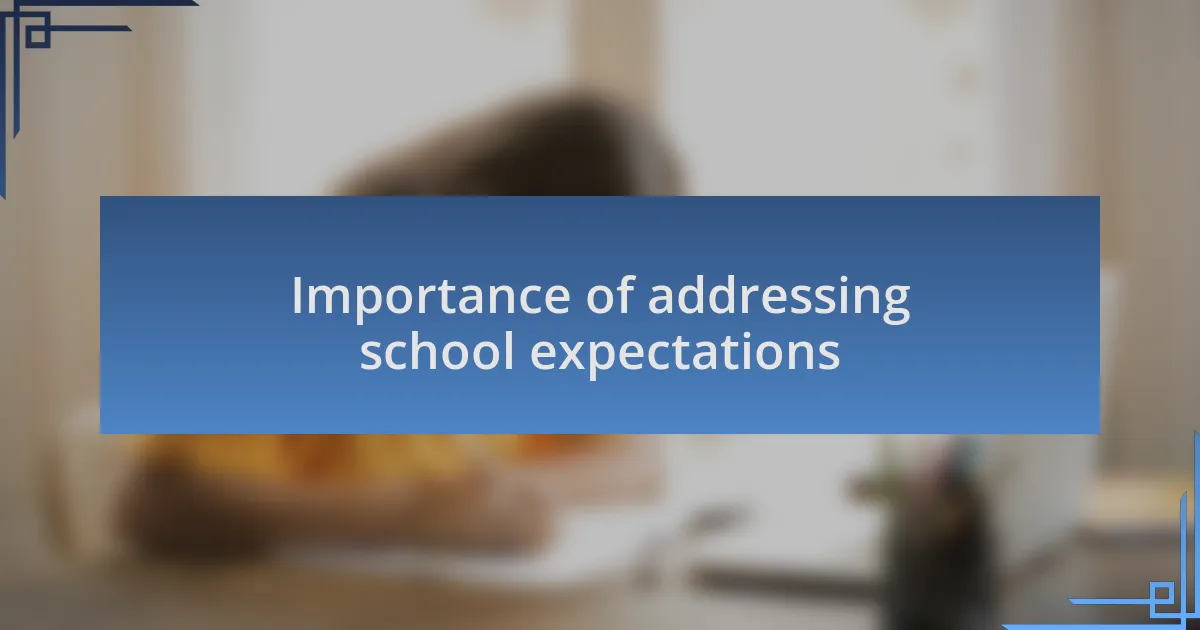
Importance of addressing school expectations
Addressing school expectations is crucial for students with dyslexia, as these expectations can significantly shape their educational experience. When I was in school, I often felt like I had to meet a one-size-fits-all standard that overlooked my unique way of learning. It’s vital that educators recognize the importance of setting realistic and tailored expectations, allowing students to flourish without the immense pressure of conforming to conventional norms.
By acknowledging the specific challenges faced by those with dyslexia, we foster an environment where individual strengths are celebrated rather than overshadowed. I recall a supportive teacher who adjusted her benchmarks for my progress, which not only boosted my confidence but also ignited my passion for learning. This shift in perspective can transform a challenging educational journey into a more positive one, making students feel valued and understood.
Moreover, addressing school expectations isn’t just beneficial for students; it also serves as a vital learning opportunity for teachers and peers. Have you ever considered how much we can learn from one another’s struggles? When we openly discuss these expectations and their impact on dyslexic students, we cultivate empathy and create a more inclusive community—one that recognizes that success looks different for everyone.
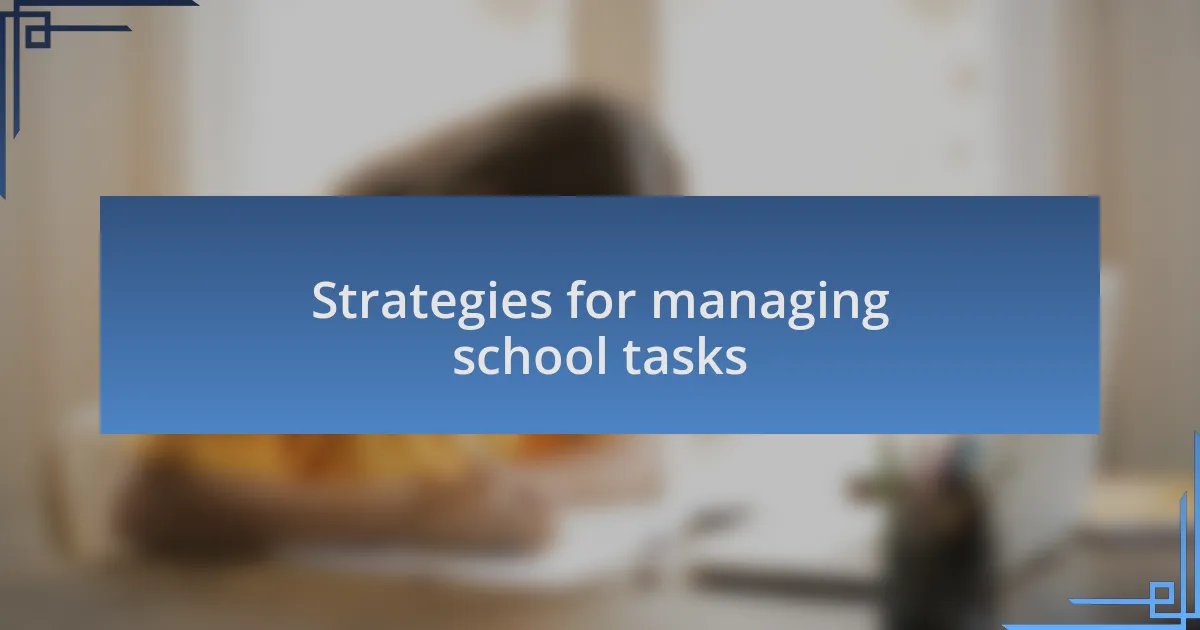
Strategies for managing school tasks
One effective strategy I’ve found is breaking tasks into smaller, more manageable parts. When faced with a larger project, it’s easy to feel overwhelmed, but focusing on one step at a time can make all the difference. I remember when I had to write a research paper; instead of aiming to complete it all at once, I dedicated days to outline, research, and then draft, which made the process feel less daunting.
Utilizing tools like checklists or planners has also been invaluable in managing my school tasks. I often jot down daily or weekly goals, and there’s something incredibly satisfying about checking items off my list. Have you ever noticed how the act of checking off a completed task can boost your motivation? It’s a small win that can propel you to tackle the next item, creating a positive cycle of achievement.
Finally, seeking support from peers and teachers can be a game-changer. When I struggled with a math concept, collaborating with a classmate not only clarified my misunderstanding but also made the learning process enjoyable. Don’t hesitate to reach out; sometimes, sharing your challenges can lead to unexpected solutions and friendships. How often do we underestimate the power of a simple conversation in shaping our educational experiences?
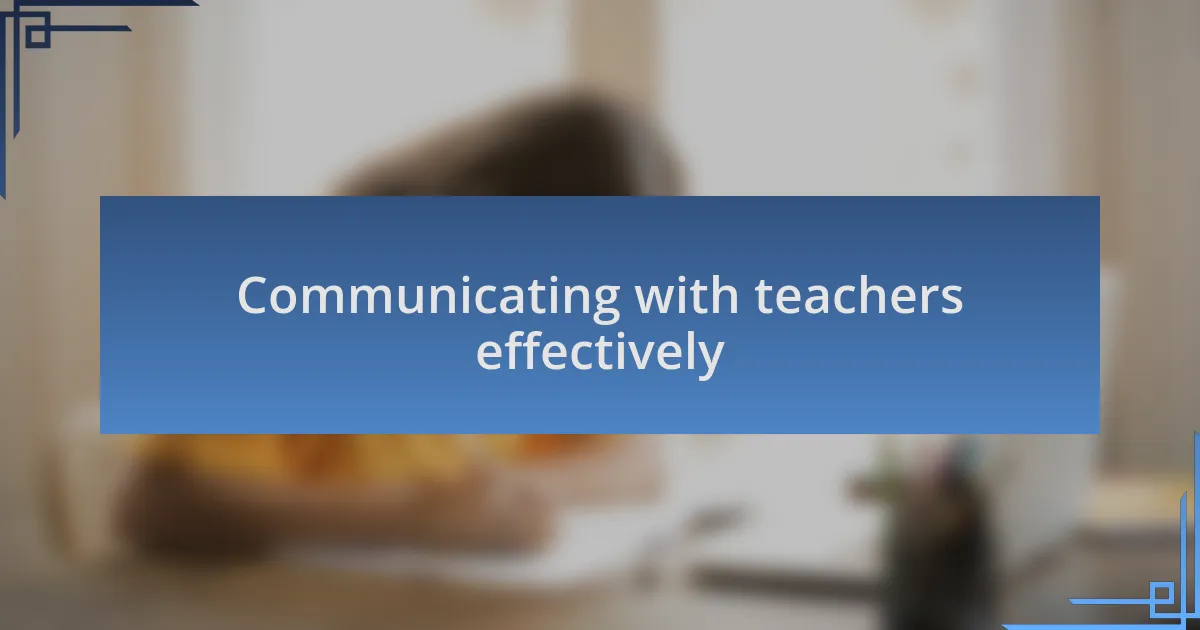
Communicating with teachers effectively
Having open lines of communication with teachers has been essential for me. I remember when I was struggling with reading assignments; I decided to approach my teacher during lunch. I felt nervous at first, but she was incredibly understanding, which made me realize how willing teachers are to help when you share your challenges. Don’t you think it’s crucial to voice our difficulties? It’s like opening a door to a collaborative support system.
When I communicate with teachers, I try to be clear about my needs and preferences. For instance, I once asked my science teacher if I could receive instructions in a different format — visual aids instead of just texts. That conversation not only helped me grasp the material better but also showed my teacher that I was proactive about my learning. How often do we forget that teachers appreciate when we take the initiative to articulate our learning styles?
Moreover, following up after a meeting or conversation can make a significant difference. I recall telling my math teacher after a discussion on assignments that her feedback helped, which encouraged her to provide even more tailored support. This simple act of acknowledgment created a stronger bond between us. Do you realize how affirming it can be for educators when they know their efforts truly matter? It fosters a reciprocal relationship where both parties thrive.
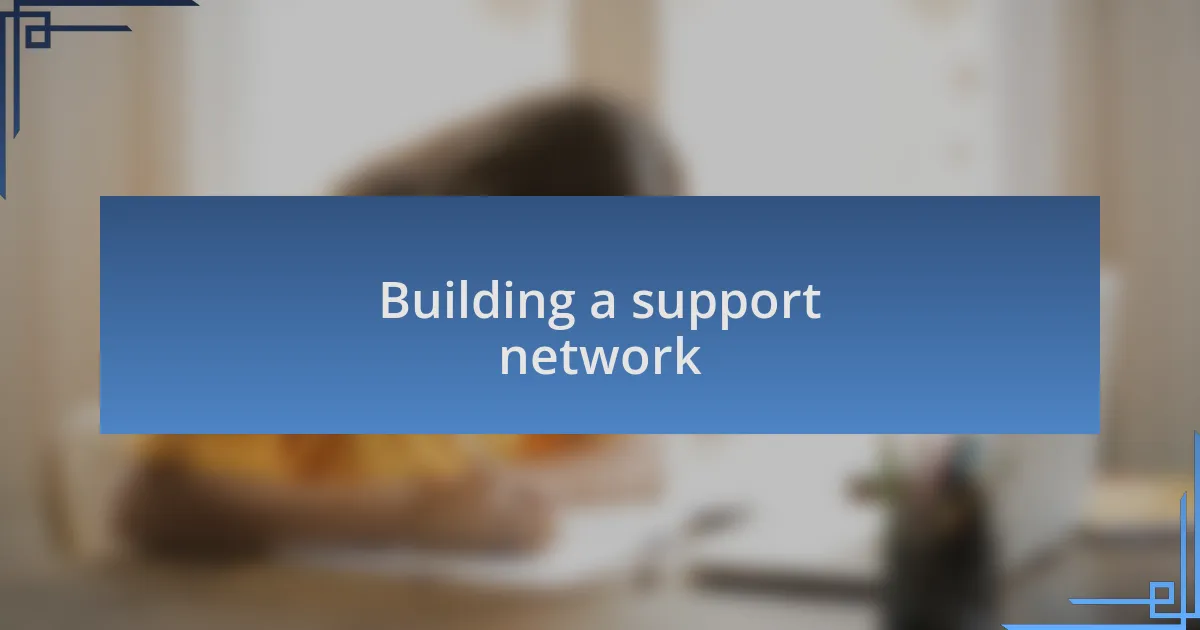
Building a support network
Building a strong support network has proven invaluable in my educational journey. I remember when I joined a dyslexia support group; it was an eye-opening experience. Surrounded by others who could relate to my struggles, I felt a sense of belonging that I had never experienced before. Have you ever felt more at ease just by knowing others share your experiences?
Engaging with my peers has also enriched my support network. I recall forming a study group with classmates who were open about their challenges too. We would share strategies and tips, which not only made learning more enjoyable but also strengthened our friendships. Isn’t it fascinating how collaboration can turn a stressful situation into a supportive and motivating experience?
Additionally, I sought advice from a mentor who had overcome similar obstacles. Her personal stories and the strategies she shared taught me resilience and creativity in managing my tasks. I realized that mentorship could be a key ingredient in building a reliable support system. Isn’t it comforting to know that we can learn from those who have walked a similar path?
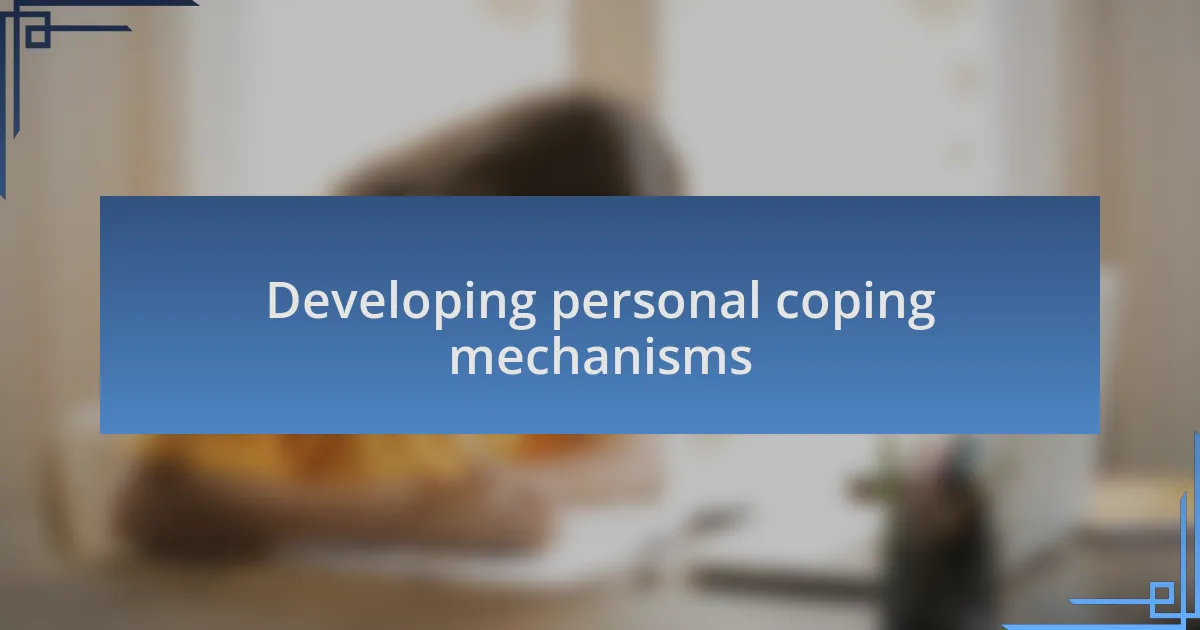
Developing personal coping mechanisms
Finding effective coping mechanisms tailored to my learning style was essential in managing school expectations. I vividly recall when I started using color-coded notes for different subjects. It transformed my study sessions from chaotic to organized, making complex topics feel more manageable. Have you ever noticed how a simple change can redefine your learning experience?
Another technique I found helpful was practicing mindfulness before exams. I would take a few moments to close my eyes and breathe deeply, allowing myself to feel calm and centered. This routine not only eased my anxiety but also helped me focus better during tests. Isn’t it interesting how taking a pause can enhance clarity and performance?
Lastly, I learned the importance of breaking tasks into smaller, more digestible pieces. For instance, when faced with a big project, I would set achievable goals for each day. This not only reduced my overwhelm but also provided a sense of accomplishment with each completed step. Have you ever felt that rush of motivation after ticking items off a to-do list? It can be a game-changer in maintaining motivation and progress.
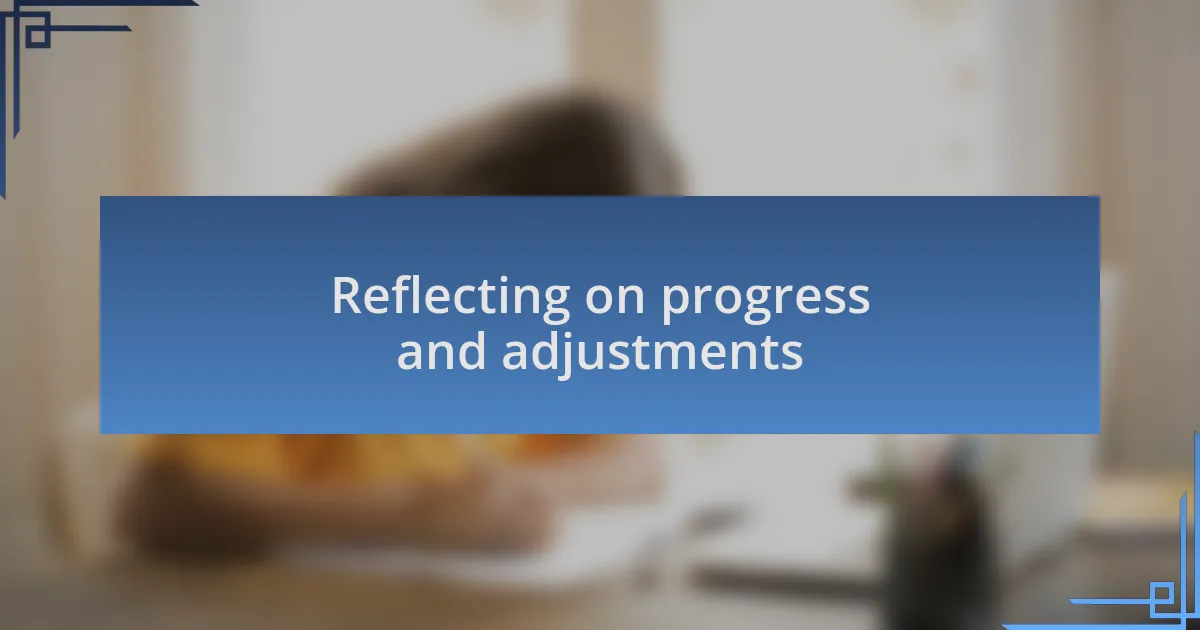
Reflecting on progress and adjustments
Reflecting on my progress has been a crucial part of understanding what works for me. I’ve kept a journal where I write down my experiences after each term, which helps me see patterns in my learning. It’s fascinating how by simply documenting my efforts, I can identify what adjustments I need to make for future success. Have you ever considered how introspection can guide your choices?
Adjustments along the way often come with their own set of emotional challenges. There were times I felt disheartened when certain strategies didn’t yield the results I hoped for. Yet, with each setback, I learned to embrace flexibility and look for alternatives, realizing that adapting my approach is part of the learning process. Isn’t it empowering to know we can pivot and create new paths to achievement?
Over time, I’ve found that celebrating small victories significantly boosts my morale. After successfully implementing a new study technique or achieving a goal, I take a moment to reflect and appreciate my hard work. This practice not only motivates me to keep pushing forward, but also reinforces my belief that my efforts are paying off. Have you ever taken the time to acknowledge how far you’ve come? It’s a powerful reminder of your potential.